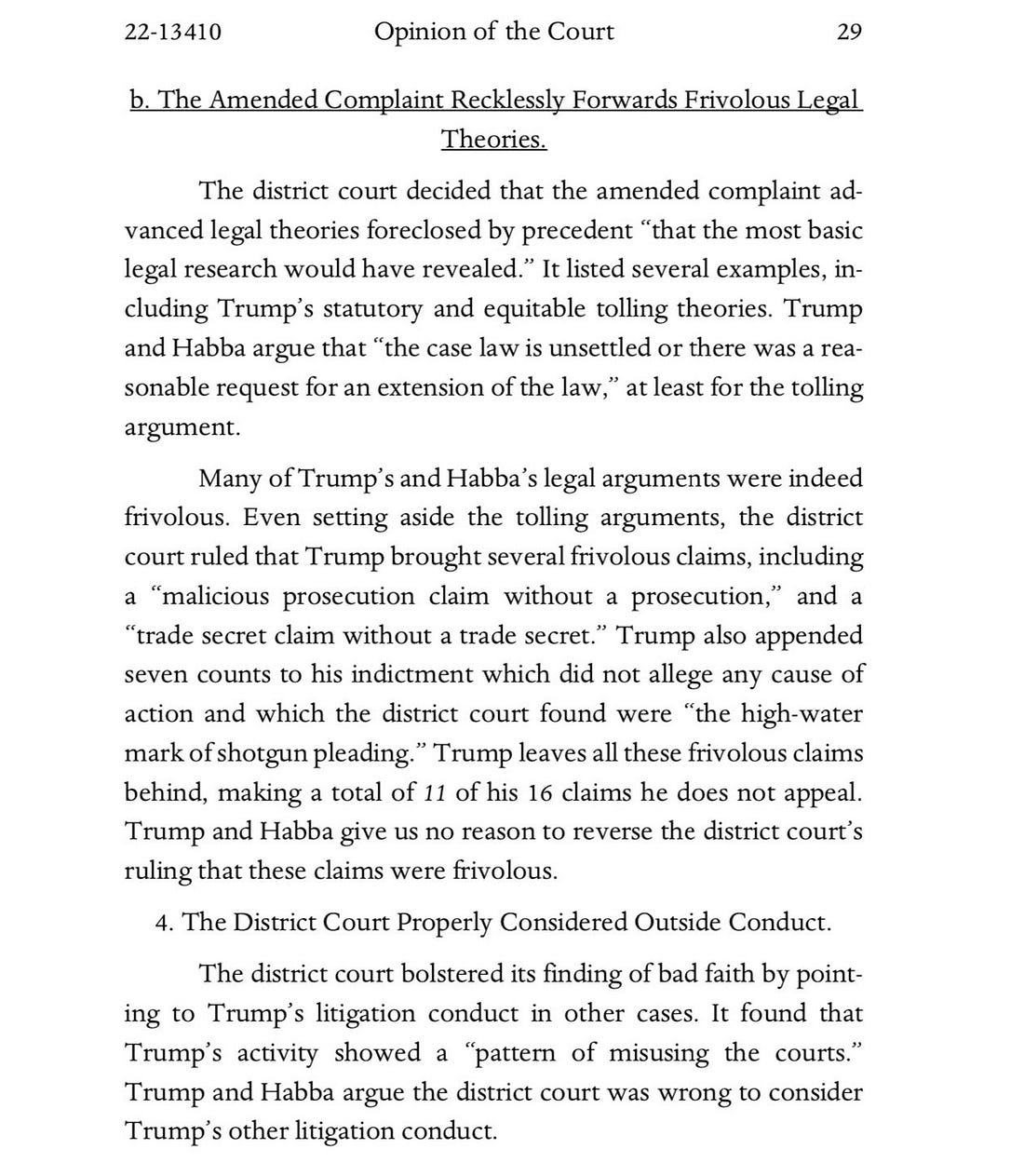|
 |
The Wednesday before Thanksgiving isn’t usually a big news day. Today, that mold got broken. Tonight’s post is an effort to cover the waterfront and keep you up to date as we head into Thanksgiving.
The Eleventh Circuit Court of Appeals affirmed a million dollar damage award against Donald Trump and Alina Habba for filing frivolous claims in Trump v. Clinton:
In 2022, Donald Trump filed a lawsuit against dozens of defendants, including Hillary Clinton, the DNC, and James Comey, alleging claims like RICO and arguing that “in the lead-up to the 2016 election, Hillary Rodham Clinton, the presumptive presidential nominee for the Democratic Party, conspired with others to ‘weave a false narrative’ about him. Clinton and her allies sought to ‘discredit, delegitimize and defame’ Trump by fabricating a story that he and his campaign colluded with Russia.” Trump was represented by Alina Habba (his current U.S. Attorney in New Jersey) and others. The district judge dismissed the claims as frivolous and imposed sanctions, which rarely happens in federal courts.
On Wednesday, the Eleventh Circuit’s Chief Judge, Bill Pryor, wrote in a unanimous decision that affirmed the sanctions the district judge ordered that “because Trump and his attorneys committed sanctionable conduct and forfeited their procedural objections, we affirm both sanctions orders.” The panel held that Trump had forfeited other claims, like a Florida state provision akin to defamation and one for conspiracy to commit malicious prosecution, because Habba failed to raise them in a timely fashion. The court also cited Habba for abandoning an argument that Trump didn’t receive sufficient notice and that the court failed to hold a hearing before the sanctions were imposed.
Pryor was appointed by President George W. Bush. Trump and Biden each appointed one of the other two judges on the panel. Pryor was once on the short list for Supreme Court consideration with Trump. So it’s hardly a panel that was biased against the president and his lawyer. Trump can now pay up or attempt to get the Supreme Court to hear his appeal.
Georgia case over:
The prosecutor appointed to replace Fani Willis in Georgia moved to dismiss the election fraud conspiracy case against Donald Trump and others. On Wednesday, Judge Scott McAfee just granted that motion. The case is over, a result that has been preordained ever since Willis was removed from the case by the Georgia Court of Appeals because of the “appearance of impropriety” stemming from her romantic relationship with the special prosecutor she had hired.
After Willis’ removal, Pete Skandalakis, the executive director of the Prosecuting Attorneys’ Council of Georgia, took over the case. He wrote that the indictment “alleges a compelling set of acts” that, if proven beyond a reasonable doubt, “would establish a conspiracy undertaken by multiple individuals” working to overturn the 2020 presidential election. But he declined to take the case for reasons involving the difficulty of prosecuting a sitting president and the complexity of the legal issues in the case, like presidential immunity, concluding that “bringing this case before a jury in 2029, 2030, or even 2031 would be nothing short of a remarkable feat.”
Congressman Raja Krishnamoorthi offered this assessment of the end of the case, which prominently featured Trump’s “I just want to find 11,780 votes” phone call, which led to the investigation and prosecution. “The case may have been dropped,” the Illinois Democrat tweeted, “but history will always remember President Trump tried to interfere in Georgia’s election and circumvent the will of the people.”
North Carolina gerrymandering case:
A three-judge panel ruled on Wednesday that North Carolina’s newly redrawn congressional map can be used for the 2026 midterm elections. That map, undertaken after Texas heeded Trump’s call to add safe Republican seats in Congress, creates an additional seat likely to be won by a Republican. Lawyers for the state argued that the legislature was motivated to create the new map for partisan reasons, not racial ones. The Supreme Court has said it will not reverse decisions made by legislatures for that sort of reason.
In Rucho v. Common Cause, Chief Justice Roberts held that the courts lack the ability to reach the “political questions” that are presented by “partisan gerrymandering claims,” effectively blessing legislative decisions made on that basis. He did so while conceding that “excessive partisanship in districting leads to results that reasonably seem unjust” and that permitting a party holding power in a state legislature to do so is “incompatible with democratic principles.” Stanford Law Professor Pam Karlan explained what this means on her podcast: “We tell ourselves this story that every two years, voters go into the voting booth and pick their member of the House of Representatives. And right now it’s the other way around. The politicians are going into a room and picking their voters.”
Instead of going to a single district court judge, as most cases do, a panel of three federal judges handles gerrymandering cases. 28 U.S.C. § 2284 requires the use of a three-judge panel for any case that challenges “the constitutionality of the apportionment of congressional districts or the apportionment of any statewide legislative body,” a reference to the maps drawn by state legislatures that define congressional districts. The statute also requires that at least one appellate judge be included on every panel. These cases are appealed directly to the U.S. Supreme Court, which is required to hear the appeal.
Trump's effort to intimidate members of Congress who served:
Apparently affronted by the suggestion that members of the military and intelligence community shouldn’t follow illegal orders, the administration has launched an intimidation campaign against members of Congress who made a video stating that non-controversial proposition. The Defense Department announced its investigation into “serious allegations of misconduct” against Arizona Senator Mark Kelly, a retired astronaut and military veteran, on Monday. On Tuesday, there were reports that the FBI would attempt to interview all six of the Democrats in Congress who made the video.
Trump, who has apparently forgotten what a real insurrection looks like, has accused the six of seditious behavior. Secretary of Defense Pete Hegseth called the six Democrats in the video the “Seditious Six.”
As Barb McQuade noted on social media today, “The FBI’s operations guidelines forbid initiating an investigation on the basis of First Amendment protected activity.” In fact, protected speech was part of the stated reason that the FBI didn’t distribute a formal intelligence bulletin ahead of January 6, even though FBI intelligence analysts had information about possible violence aimed at the Capitol.
The idea that a video that correctly states the law could give rise to a criminal investigation into United States senators and members of Congress should be laughable, but it isn’t under this administration. We’ve seen this before: law firms, universities, revenge prosecutions. Fascists leaders try to intimidate people into obedience. But if the past months have taught us anything, it’s that courage is contagious. Senator Kelly isn’t running away from the fight, nor are any of the others.
National Guard Shooting
CBS News reported Wednesday evening that the man who ambushed West Virginia National Guard troops a few blocks from the White House, leaving two of them in critical condition with gunshot wounds, is Rahmanullah Lakanwal, an Afghan national. DHS Secretary Kristi Noem tweeted that he entered the U.S. in 2021, as the Biden administration was withdrawing from Afghanistan. She failed to mention that Lakanwal applied for asylum in December 2024, underwent a vetting p

